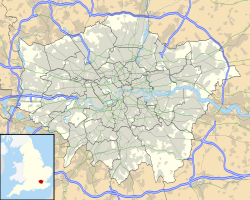| Shree Swaminarayan Mandir, London (Willesden) | |
|---|---|
 The first Swaminarayan temple in London | |
| Religion | |
| Affiliation | Hinduism |
| Deity | Swaminarayan in the form of Ghanshyam |
| Location | |
| Location | London |
| Country | England |
| Coordinates | 51°32′45.4″N0°12′55″W / 51.545944°N 0.21528°W |
| Architecture | |
| Completed | October 11, 1975 |
Shree Swaminarayan Temple Willesden is a Swaminarayan Mandir under the Nara-Narayan dicoese in the London suburb of Willesden. [1]


